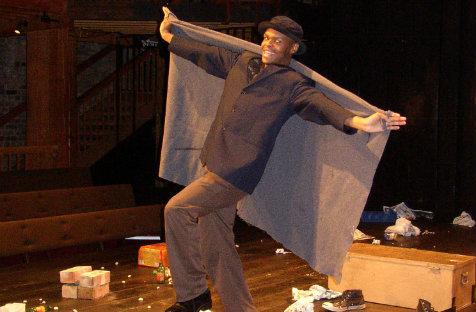In the South African township of Itoseng, a young man, Mawilla, sits on his trunk. Where he sits was once the shopping mall. Now, empty space. Scattered rubbish. A trail of fine sand. Nothingness.
For the people of Itoseng, the end of apartheid was heralded with great hope. But instead, the town found itself stagnant. With the shopping mall burnt down in a fit of youthful collective foolishness – brash noise with no real impetus – and nothing to replace it with, the empty space it left in the town was more than just physical. Gone was the entertainment, gone were the jobs.
Itoseng, written and performed by Omphile Molusi, is Mawilla’s story of his town and the woman he loves. Or perhaps, of the town he knew and the woman he loved: the thing most crucially lost is hope.
On the wide Space Theatre stage, a lane of fine sand extends corner-to-corner, footprints extending across the rest of the black stage surface. Through the production Molusi kicks up the dust, tracks of footprints building up a picture of the work’s blocking. Scattered through the space is rubbish: drink bottles, sheets of newspapers, plastic bags and old shoes. At times Molusi appropriates these for props and sound effects, but for the most part they are just part of the desolation that Itoseng now faces.
The show works best when Molusi reaches out to his audience, directly talking to us and asking us to remember and reconnect with previous characters he has introduced. In these moments, Molusi’s warmth is evident, and he carries in himself a real investment in the characters and in his audience’s understanding of the work.
These moments, though, are lost in the wider work, where Molusi doesn’t carry as much weight in his performance as he needs to. His Mawilla feels uncentered and lacking in gravity, the performance sitting high in Molusi’s chest and shoulders, instead of dropping down and being carried through his body. Mawilla tells us about the emptiness that has engulfed his town, of the lack of direction and employment its residents face, the plight of the woman he loves – but without weight, these all carry an air of superficiality.
The central conceit of the work, too, takes too long to truly be apparent. For much of the work the character Dolly seems like little more than another of the passing characters, and it isn’t until the end of the work Molusi ties these strands together to show the depth of Mawilla and Dolly’s relationship – and thus her relationship to Molusi’s text.
It’s in these elements that Molusi, still a young artist, needs to find maturity to really be able to connect the work to his audience. The story he tells of lost hopes and loves is infected with Mawilla’s easygoing nature, of positivity towards life and towards telling his story to the audience. But in the light, Molusi could afford to find more shade.
Rating: 3 stars out of 5
Richard Jordan Productions LTD
In association with The Baxter Theatre University of Cape Town and Pleasance present
Itoseng
Written and performed by Omphile Molusi
Space Theatre, Adelaide Festival Centre
1 – 4 March
Adelaide Festival 2013
www.adelaidefestival.com.au
1 – 17 March





